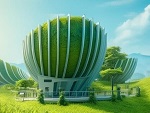The bioeconomy is a major concept in both academic and policy debates, but what it actually means remains diverse across contexts. In a qualitative analysis of the discourse on the bioeconomy, my literature review identifies three archetypical bioeconomy narratives: the “neoliberal bioeconomy”, the “ecological bioeconomy”, and the “transformative bioeconomy”. Each narrative follows a particular rational of viewing the world, leading to different implementation pathways for the global bioeconomy. While biobased resources play an important role in all narratives, they differ significantly in their sustainability concept, their inherent goal of economic activity, their views on which role society plays in an economy, their approach to science and knowledge-management within society and economy, and they differ in terms of their onto-epistemological positions.
While there are two narratives that, although clearly distinct in their epistemological approach, are quite similar in framing the socio-ecological transformation as a process that can be catalyzed through a bioeconomy (the two "Sustainable Bioeconomy Narratives"), the main argument of my proposition lies in distinguishing these two narratives from the unsustainable narrative of the currently dominant "Neoliberal Bioeconomy" (NeoBE).
The NeoBE is based on a flat ontology that reduces the multifaceted reality of entities to abstract numerical exchange values and therefore assumes that individual utility maximization (estimated as profit-oriented cost-benefit-optimum) ultimately leads to greatest benefit for overall society. This is represented by the currently mainstreamed set of techno-economic paradigms for biobased resources that rely on a liberally governed free-market economy of growth and competition that has however not produced sustainable results so far. This also represents a discursive lock-in, in the sense that intentions of sustainability end up their opposite because underlying paradigms inevitably lead to unsustainable practice.
The Sustainable Bioeconomy Narratives (SustBE) on the other hand regard entities (and thus humans) als uniquely constituted by their environment. The economic goal is set to minimize the entropic degradation of resources and aid the natural reproductive capacities of ecosystems in order to enable a globally cooperative, fair and just "good life for all" within planetary boundaries. Consequently, co-creation of science-based policies in locally embedded actualities through bottom-up approaches takes precedence over top-down strategy development, though both approaches can be found in SustBE. Overall, the development of human nature is guided through transformative scientific approaches to consistently integrate with non-human nature's imperative.
Upon closer examination, the SustBE-narratives can further be distinguished between an ecocentric approach that primarily argues for a socio-ecological transformation based on the functional principles of varied ecologies in non-human nature in order to maintain our basis of existence (the "Ecological Bioeconomy", EcolBE), and a sociocentric approach that argues for the same socio-ecological transformation, but is primarily exploring the sociocultural structures that would organize our civilization as a convivial species (the "Transformative Bioeconomy", TrafoBE). TrafoBE is thus more engaged with philosophical questions and regards the bioeconomy as an ethic which debates the socio-cultural issues of life, whereas EcolBE is more concerned about the biophysical and material aspects. Both narratives can be said to emerge from a process-relational school of thought, however EcolBE assumes discrete systems (i.e. “the economy”) that can be transitioned between relatively stable states by reconfiguring the arrangement of their (similarly discrete) system elements (i.e. “society” or “technology”), whereas TrafoBE assumes temporarily stabilized patterns of relations (instead of systems or elements) that are transformed by inclusion or exclusion of constituting patterns.
Setting the finer epistemological points aside, EcolBE and TrafoBE can be both regarded as narratives of the socio-ecological transformation. NeoBE, on the other hand, can be understood as the branch of Neoliberalism that is associated with organic matter, an evolutionary step in the development of liberal governmentality that has by now depoliticized most decisions by entrusting them to techno-economic paradigms that are falsely assumed "objective" or "independent". The stories that the NeoBE-narrative produces, are mostly focussed on the development of products and their relation to technology and measurements. EcolBE-stories, on the other hand, also include the resources that are necessary to produce them, and most importantly, the limits (to growth) that arise from these resources. TrafoBE-stories, finally, see products merely as means to an end. The end being a societally negotiable "quality of life". The TrafoBE-narrative thus is a way of explicitely communicating sustainability as broader societal discussions about values and norms.
For example, knowledge-dissemination happens in the NeoBE through commodification and intellectual property rights, and market rationality and deregulation in governance are supposed to spur these innovation cycles. In SustBE, knowledge-dissemination triggers societal development through transformative and transdisciplinary science, and participative co-creation in highly embedded localities develops robust governance structures.
As all narratives of the Bioeconomy claim to increase overall wellbeing for humanity, but demand radically different implementations, a closer examination of their functional principles was necessary. The results indicate that these functional principles concern philosophical foundations and cultural dynamics, and are intricately related to individual preferences and norms. The Bioeconomy thus represents a value system, and discussions about it need to be engaged through ethics. With this perspective, I hope to enrichen the necessary broader societal debate on the implementation of the bioeconomy, and add to the understanding of the bioeconomy as an holistic concept.

 PDF version
PDF version
